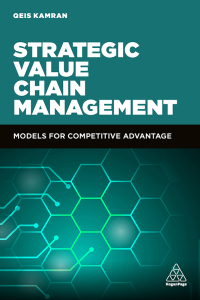Buy Strategic Value Chain Management: Models for Competitive Advantage 1st Edition PDF ebook by author Qeis Kamran – published by Kogan Page in 2021 and save up to 80% compared to the print version of this textbook. With PDF version of this textbook, not only save you money, you can also highlight, add text, underline add post-it notes, bookmarks to pages, instantly search for the major terms or chapter titles, etc.
You can search our site for other versions of the Strategic Value Chain Management: Models for Competitive Advantage 1st Edition PDF ebook. You can also search for others PDF ebooks from publisher Kogan Page, as well as from your favorite authors. We have thousands of online textbooks and course materials (mostly in PDF) that you can download immediately after purchase.
Note: e-textBooks do not come with access codes, CDs/DVDs, workbooks, and other supplemental items.
eBook Details:
Full title: Strategic Value Chain Management: Models for Competitive Advantage 1st Edition
Edition: 1st
Copyright year: 2021
Publisher: Kogan Page
Author: Qeis Kamran
ISBN: 9780749484422, 9781000392524
Format: PDF
Description of Strategic Value Chain Management: Models for Competitive Advantage 1st Edition:
Supply Chain Processes?introduces readers to the view that genuine supply chain competitive advantage is achieved via supply chain excellence which in turn is underpinned by supply chain process excellence. The ultimate supply chain goal is to deliver the right product, of the right quality, in the right quantity, to the right place, at the right time and for the right cost. The author identifies four core supply chain processes – strategy, design, execution and people – to which the process?improvement?techniques explained can be applied to ensure superior supply chain performance. Key topics are addressed, including supply chain risk, resilience, sustainability, challenges confronting modern-day supply chains and developing an elegant supply chain design. Each chapter starts with a section that explores learning opportunities and is followed by detailed chapter content. Carefully explained examples are provided, as well as end of chapter case studies, review questions and written assignments. A full suite of teaching aids is also provided for lecturers and tutors. Providing both management expertise and technical skills, which are essential to decision-makers in the supply chain, this textbook should be essential reading for undergraduate and post-graduate students, working people or mature aged persons wanting to upgrade their qualifications, and operating supply chain leaders and supply chain professionals. Online resources include chapter-by-chapter PowerPoint slides, tutorial exercises, written assignments and a test bank of exam questions.





